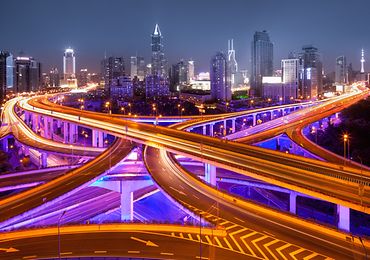Smart Cities
Urbanization
Why do we need standardization?

According to the OECD, by 2050 roughly 70% of the world's population will live in cities. The steadily increasing population density - and the associated increase in traffic - require new approaches to urban planning. For example, utilities are no longer considered individually, in an isolated manner, but as a networked whole. In this holistic approach, the urban infrastructure is seen as a kind of central nervous system. The modern city: A system of systems.
Energy, water, telecommunications, traffic ... up to now, each system has been optimized separately, most often without taking related systems into consideration. The networking of these systems is what makes an urban environment "intelligent". The result: better communication between systems and a regular exchange of information. But this complex networking requires the use of standards and specifications.
DIN is in dialogue with city governments, research organizations, private companies, associations and urban developers of innovative technologies. Our aim is to harmonize German products and services with global developments. Standards define interfaces and help bring our innovations to other countries.
Working together with our partners in dialogue, we have drawn up the following definition:
A smart city is a settled area which utilizes systemic (in terms of ecological, social and economic aspects) and sustainable products, services, technologies, processes and infrastructures, in most cases supported by highly integrated and networked information and communications technologies.


